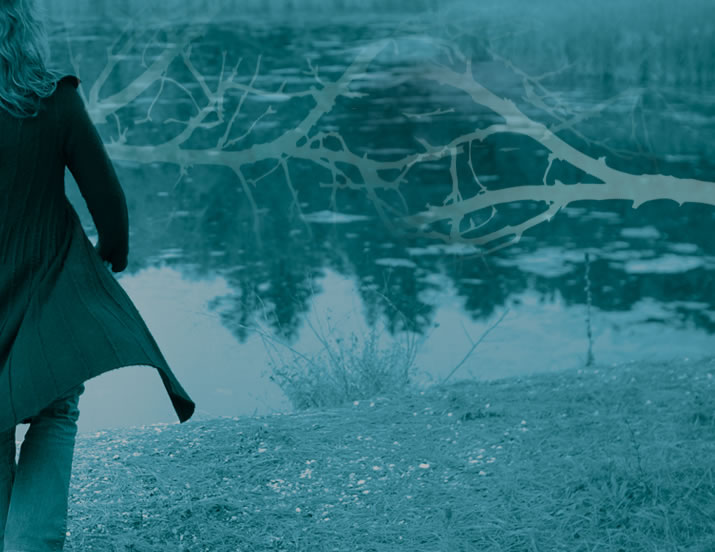
Website © 2009 Alise Marlane. Photography: FranziskaHeinze.com; Painted Bird: JohnFMarok.com; Alise Marlane's Homepage > Press

Click titles to expand text
Review of Room For Less
By Kees Van Wee,
Heaven Magazine 06/05/09
WELL WORTH THE WAIT Five years ago her debut Stillness Hold On made a deep impression. In her songs Alise Marlane, from Canada, unified the best of Joni Mitchell, Jonatha Brooke and Suzanne Vega into a completely unique, varied sound, with which she outclassed the more recent work of these three colleagues. Her versatility later stood out again in her work as the musical director of the play Cabaret Civil (the strong soundtrack has appeared on cd) and her cooperation with Jennifer Noxon and Chris Maclean in the trio Frida’s Brow, which released an impressing cd that at times reminded of Kate & Anna McGarrigle. Absolutely beautiful and our heart skipped a beat when we saw that a new solo cd had been released. Room For Less, which comes in an ecologically correct digipack, nicely connects with her previous cd, with fabulous songs, which often have a jazzy tinge. But there are also some differences. This time Alise doesn’t only sing in English but also in French and for a short moment even in Spanish. She explores new territories, including Western Swing, and the second half of the cd has a somewhat more intimate, quieter sound. Speaking of sound, the cd sounds absolutely amazing again. The upright bass and sousaphone go pleasantly deep, other instruments sparkle and Alisa’s bright voice has been recorded perfectly again. Oh, and before we forget, her lyrics, in which she sometimes lightheartedly battles with greed and our consumer society (the title track), are top of the bill again.
Review of Room For Less
By Rein van den Berg,
Rootsville.be, Johnnysgarden.nl 04/05/09
Translated from Dutch to English by Peter Andree
After several listens, I am totally taken by this singer/songwriter Alise Marlane. Much can be said about the variety of music styles that she has easily woven into her jazzy approach to folk music. Aside from the very romantic piece, A Sailboat in the Moonlight, and the love song about the seal in Alaska, this new album is made of original material. Production of her previous album was in the hands of the muti-talented Ian Tamblyn, but the partnership of Alise and James Stephens is certainly no less impressive. Room for Less is very easy to listen to and makes a strong impression. Stillness Hold On has an outstanding reputation among music-lovers, and is especially known for having brought to the wider public a high quality, but lesser-known, singer.
Luckily, Alise lives up to the expectations with these 13 fresh works. Romantic, full of life, and with a careful eye for detail, she brings optimistic and lively perspectives on her surroundings, ideas and experiences. Room for Less is somewhat introspective, but her reflections are chock-full of beautiful and memorable metaphors. Alise looks at daily life with all of its possibilities and impossibilities. There are challenges, unfulfilled moments, wrongdoings, and much more, but this does not mean we have to close our eyes. She doesn’t give any answers, but puts the accent on purity rather than being paralyzed by sorrow and complexity. Life is limited, so let’s make sure we make something beautiful of it is her central message.
The voice of Alise Marlines sits comfortably in the mix, and the multiple instruments featured are a nice complement to it. There is wonderful musicianship here provided by diverse Canadian artists that help to make this album very rich. Old friend Fred Guignon is in the party, but so is John Geggie, Don Cummings, Peter Von Althen and Alvaro de Minaya. It took some time, but Alise can now say again with a peaceful heart that she has created an outstanding album. This is a thoughtful and rustic singer song-writer album that I heartily recommend to everyone to enjoy.
Review of Stillness Hold On
By Annie Clifford,
Penguin Eggs, Summer '04
Sometimes very, very good things come
out of Ottawa – GST cheques, Kathleen Edwards, Rebecca Campbell,
public anti-war declaration – here's another one for that list.
Marlane's début is fresh and invigorating as the great
Canadian wilderness with images like: “where no angel dares to
leave impressions of wings for fear of disturbing a surface so
clean.” A voice charmingly like Suzanne Vega, and the timelessly
brilliant production of Mr. Ian Tamblyn, results in a record that
makes Canadian folk music proud. Marlane's songs are grand on their
own (especially notable numbers include Crows for Life and Rice
Paper), but the tasteful and lush orchestration makes them into real
national, northern wonders – part of the elusive and distinguished
Canadiana genre.
Folkfest Find Makes Her Mark
By Lynne Saxberg,
The Ottawa Citizen, 02/14/04
People are beginning to talk about Alise Marlane, a singer-songwriter who makes her home in the Wakefield area, like she's the next Kathleen Edwards or something. She's not. Her music is completely different. Really, the only thing she has in common with the red-headed edwards lass is that both songwriters wrote a bunch of material in Wakefield. In Edwards' case, it came off with an alt-country edge. Marlane's music is a little more elusive to categorize, but after careful inspection of her well-crafted first disc, Stillness Hold On, let's call it lyrical folk with a jazzy twist. Marlane's clear voice and sparkling guitar work are the hallmarks of her sound, a style that puts her in the company of fellow Ottawa-area singer-song-writers such as Lynn Miles, Jennifer Noxon and Chris MacLean.
With help from some of the cream of the local scene, including Ian Tamblyn's production, Peter Keisewalter's soprano sax and John Geggie's bass, this Montreal native, who's been living on the Gatineau side of the river for five years, has come pretty close to defining an Ottawa sound, if there is such a thing - and whether she realizes is or not.
As a songwriter, Marlane's work on this disc is characterized by images of the Gatineau Hills, changing seasons and the conflict between civilization and nature. She mentions the Gatineaus by name in Hard Winter Soul, then goes on to sing about great blue herons, crows and hummingbirds and other creatures. Often, she's an impressionist who conveys her emotions with strong visual imagery instead of a straight narrative.
When Marlane sings about the "day blowin' in swirling chills round my heart" in Snowglobe, you'll feel the chill of a snowy day, too, perhaps not realizing the song is actually about a lost love. But when her crystalline voice evokes the joy of a warm breeze from the southern skies" in Hard Winter Soul, there's no mistaking the triumph of having survived another tough winter, the thrill of the first signs of spring. It's a song we can all relate to, especially after last month's bitter cold.
Marlane's music is not all wintry. Cover Me Bridge is a lilting ode to Gatineau's historic covered bridge, while the multi-layered Stones, co-written by Antoine Lurette-Fraser and Marlane, has a warm chorus of chanting singers in the background, and Crows For Life takes a light, smartly worded view of the "personable" side of the big, black birds.
The instrumental Highway Dogs and the weightless Rice Paper, which was recorded live at Rasputin's, are the best examples of her impressive command of acoustic guitar. She's an assertive player, but not showy. Then she picks up mandolin for Ain't No Industry, a much more straight-driving song with sharp lyrics on love not being an industry (something we need to hear on Valentine's Day). Marlane also revives an old Tamblyn song, Angels Sail Away, giving it new life with her angelic voice and a nice skip to the beat.
The CKCU Ottawa Folk Festival stumbled upon Marlane's talent last year when she won a last-minute audition for a spot at the festival. This disc will help her find an audience among folk fans across the country. Alise Marlane plays at the Library and Archives of Canada at 8 p.m. tonight as opener for Ron Sexsmith.
With help from some of the cream of the local scene, including Ian Tamblyn's production, Peter Keisewalter's soprano sax and John Geggie's bass, this Montreal native, who's been living on the Gatineau side of the river for five years, has come pretty close to defining an Ottawa sound, if there is such a thing - and whether she realizes is or not.
As a songwriter, Marlane's work on this disc is characterized by images of the Gatineau Hills, changing seasons and the conflict between civilization and nature. She mentions the Gatineaus by name in Hard Winter Soul, then goes on to sing about great blue herons, crows and hummingbirds and other creatures. Often, she's an impressionist who conveys her emotions with strong visual imagery instead of a straight narrative.
When Marlane sings about the "day blowin' in swirling chills round my heart" in Snowglobe, you'll feel the chill of a snowy day, too, perhaps not realizing the song is actually about a lost love. But when her crystalline voice evokes the joy of a warm breeze from the southern skies" in Hard Winter Soul, there's no mistaking the triumph of having survived another tough winter, the thrill of the first signs of spring. It's a song we can all relate to, especially after last month's bitter cold.
Marlane's music is not all wintry. Cover Me Bridge is a lilting ode to Gatineau's historic covered bridge, while the multi-layered Stones, co-written by Antoine Lurette-Fraser and Marlane, has a warm chorus of chanting singers in the background, and Crows For Life takes a light, smartly worded view of the "personable" side of the big, black birds.
The instrumental Highway Dogs and the weightless Rice Paper, which was recorded live at Rasputin's, are the best examples of her impressive command of acoustic guitar. She's an assertive player, but not showy. Then she picks up mandolin for Ain't No Industry, a much more straight-driving song with sharp lyrics on love not being an industry (something we need to hear on Valentine's Day). Marlane also revives an old Tamblyn song, Angels Sail Away, giving it new life with her angelic voice and a nice skip to the beat.
The CKCU Ottawa Folk Festival stumbled upon Marlane's talent last year when she won a last-minute audition for a spot at the festival. This disc will help her find an audience among folk fans across the country. Alise Marlane plays at the Library and Archives of Canada at 8 p.m. tonight as opener for Ron Sexsmith.
Wakefield's Beauty Stirs Singer
By Allan Wigney,
The Ottawa Sun, 01/07/04
The new year did not get off to the greatest start for Alise Marlane, whose skills as a guitarist, singer and songwriter are apparently greater than her ability to play Canada’s game.
“I broke my leg while playing pond hockey on New Year’s Day,” Marlane reports. “I was feeling pretty good out there, ‘til Ian passed me the puck.”
That’s Ian as in Tamblyn, the legendary local artist who has deftly stickhandled his way through countless projects, including the production of Marlane’s collection of jazz-infused folk songs. And he’ll be on hand this Sunday to offer defensive support for a playing-hurt Marlane at the Black Sheep Inn, alongside bassist Ken Kanwisher, percussionist Alvaro de Minaya and a brace of vocalists—Chris MacLean, Brant Lucuik and Carol Goodman.
Up front, complete with leg cast, will be Marlane, the accomplished guitarist and vocalist who settled in Wakefield some five years ago after “bouncing back and forth” between Ottawa and her native Montreal for a number of years.
“I landed here at a point in my life when I was tired of moving,” she says of her picturesque home town. “It’s amazing to be living in this oasis not far from a big city with a lot to offer. You can’t do that in Toronto.”
Marlane’s compositions reflect the beauty of her surroundings, expressing emotions and a world-weary view through the eyes of an artist struck by the falling leaves and humbling landscape around her. It’s an influence perhaps best embodied by Cover Me Bridge, a song in which a vulnerable Marlane takes comfort in the enduring charm of Wakefield’s famous covered bridge.
“It is a love song,” Marlane says, “but also a love song to the bridge. “I wouldn’t see my writing as diary writing; there are levels in the songs. I’m looking for meaning that goes beyond the superficial aspects of daily life.
And a covered bridge is something tangible, a continuum. There’s a sense of history—of permanence—there.” “You dance me to a slower time,” Marlane sings in Cover Me Bridge. “One of glory, reason and rhyme.”
A time, needless to say, before there were big-box stores on the edge of town. “In the words of (singer-songwriter) Greg Brown, the country is turning into a coast-to-coast strip mall,” Marlane says.
“And places like Wakefield are worth preserving. Why they’ve chosen to develop here, I don’t know—I fear the mall is going to open the floodgates.”
Marlane is referring to the proposed construction of just such a strip mall at the entrance to Wakefield. “I’m sure some people are for it,” Marlane shrugs. “I haven’t met any, myself, but I have met dozens who are against it. Unfortunately, we have no voice at the municipal level. And that’s a shame.
“I know these things are supposed to represent progress, but there are different visions of progress and some do not have to do with big-box stores.”
Or, as Marlane expresses it in Cover Me Bridge: “I don’t worship the past unconditionally/But sometimes I can’t see which way this world’s got me spinning.”
“I broke my leg while playing pond hockey on New Year’s Day,” Marlane reports. “I was feeling pretty good out there, ‘til Ian passed me the puck.”
That’s Ian as in Tamblyn, the legendary local artist who has deftly stickhandled his way through countless projects, including the production of Marlane’s collection of jazz-infused folk songs. And he’ll be on hand this Sunday to offer defensive support for a playing-hurt Marlane at the Black Sheep Inn, alongside bassist Ken Kanwisher, percussionist Alvaro de Minaya and a brace of vocalists—Chris MacLean, Brant Lucuik and Carol Goodman.
Up front, complete with leg cast, will be Marlane, the accomplished guitarist and vocalist who settled in Wakefield some five years ago after “bouncing back and forth” between Ottawa and her native Montreal for a number of years.
“I landed here at a point in my life when I was tired of moving,” she says of her picturesque home town. “It’s amazing to be living in this oasis not far from a big city with a lot to offer. You can’t do that in Toronto.”
Marlane’s compositions reflect the beauty of her surroundings, expressing emotions and a world-weary view through the eyes of an artist struck by the falling leaves and humbling landscape around her. It’s an influence perhaps best embodied by Cover Me Bridge, a song in which a vulnerable Marlane takes comfort in the enduring charm of Wakefield’s famous covered bridge.
“It is a love song,” Marlane says, “but also a love song to the bridge. “I wouldn’t see my writing as diary writing; there are levels in the songs. I’m looking for meaning that goes beyond the superficial aspects of daily life.
And a covered bridge is something tangible, a continuum. There’s a sense of history—of permanence—there.” “You dance me to a slower time,” Marlane sings in Cover Me Bridge. “One of glory, reason and rhyme.”
A time, needless to say, before there were big-box stores on the edge of town. “In the words of (singer-songwriter) Greg Brown, the country is turning into a coast-to-coast strip mall,” Marlane says.
“And places like Wakefield are worth preserving. Why they’ve chosen to develop here, I don’t know—I fear the mall is going to open the floodgates.”
Marlane is referring to the proposed construction of just such a strip mall at the entrance to Wakefield. “I’m sure some people are for it,” Marlane shrugs. “I haven’t met any, myself, but I have met dozens who are against it. Unfortunately, we have no voice at the municipal level. And that’s a shame.
“I know these things are supposed to represent progress, but there are different visions of progress and some do not have to do with big-box stores.”
Or, as Marlane expresses it in Cover Me Bridge: “I don’t worship the past unconditionally/But sometimes I can’t see which way this world’s got me spinning.”
Review of Stillness Hold On
By Fiona McLean,
Soulshine Magazine, 01/11/04
If there was a blizzard blowing outside, and you were cosied up at home with a blanket and a cup of tea watching the snowflakes come down, "Stillness Hold On" might be the perfect soundtrack to accompany your mood of contentedness and melancholy. On her debut CD, Montreal-born Marlane blends her thoughtful, quirky lyrics, pretty voice and acoustic guitar into a soft, jazzy sound, proving herself as one to watch for all folk fans.
Alise Marlane Talks Love, Nature and the TTC By Fiona McLean,
Soulshine Magazine, 03/07/04
Shy and soft-spoken in person, Alise Marlane opens up and shares her perspective on the world when performing her thoughtful, introspective songs. Singing about anything from "the two most important things in the world - love and nature" to the TTC, Marlane put on a relaxing, intimate show at Oasis last Thursday night.
She took the time to sit down with me pre-show and answer a few questions. Here's what she had to say:
Tell me about yourself and your background, where you're from, etc.
I'm from Montreal and Toronto. I've been back and forth. I live now in the Gatineau Hills, which is north of Ottawa. It's a small village and a beautiful place, but not too far away from a big city with some interest of culture. It's had a lot of influence on me; there's a unique and creative population there.
Are you a full-time musician?
Lately, yes. I've been playing my whole life. I started with piano; my background is classical. I started writing on guitar in my thirties - I don't know where it came from. And I've started performing more in the last few years, a result of settling in one place. But music is something I've always done.
Who are your musical influences?
Oh, I hate this question! My influences are never-ending musically. Anything and everything. Sometimes I'm not aware of influence, someone will tell me "Oh, you sound like Joni Mitchell," or whatever.
I listen to the big name female musicians: Jane Siberry, Joni Mitchell, Ani DiFranco, Joan Armatrading, Rickie Lee Jones, and Billy Holiday. As far as influences in my current life, I would say Ian Tamblyn. I went to a workshop of his a few years ago. I had already been songwriting, but it was amazingly encouraging for me: his feedback, advice and wealth of knowledge.
How would you describe your sound?
Well, record storeowners usually categorize it as folk. It's not traditional folk though; I think it crosses boundaries stylistically. I have an eclectic, folk-oriented audience that's interested in the whole package, and less interested in the mainstream, and I think that reflects my style of music. I'm still feeling it out, it's still at an early stage. I've yet to see who wants to listen.
What has the response to your album (Stillness Hold On) been like?
It's been great so far, especially locally. The number one response is that it's an album they've been able to listen to over and over again. I think people appreciate the fact that, as a debut singer-songwriter album, it isn't overproduced. I'm thrilled with the album.
What are your plans for the next little while?
Now I just want to play more, also to settle down and write, I don't want to be too hyped about the album, I want to stay focused.
She took the time to sit down with me pre-show and answer a few questions. Here's what she had to say:
Tell me about yourself and your background, where you're from, etc.
I'm from Montreal and Toronto. I've been back and forth. I live now in the Gatineau Hills, which is north of Ottawa. It's a small village and a beautiful place, but not too far away from a big city with some interest of culture. It's had a lot of influence on me; there's a unique and creative population there.
Are you a full-time musician?
Lately, yes. I've been playing my whole life. I started with piano; my background is classical. I started writing on guitar in my thirties - I don't know where it came from. And I've started performing more in the last few years, a result of settling in one place. But music is something I've always done.
Who are your musical influences?
Oh, I hate this question! My influences are never-ending musically. Anything and everything. Sometimes I'm not aware of influence, someone will tell me "Oh, you sound like Joni Mitchell," or whatever.
I listen to the big name female musicians: Jane Siberry, Joni Mitchell, Ani DiFranco, Joan Armatrading, Rickie Lee Jones, and Billy Holiday. As far as influences in my current life, I would say Ian Tamblyn. I went to a workshop of his a few years ago. I had already been songwriting, but it was amazingly encouraging for me: his feedback, advice and wealth of knowledge.
How would you describe your sound?
Well, record storeowners usually categorize it as folk. It's not traditional folk though; I think it crosses boundaries stylistically. I have an eclectic, folk-oriented audience that's interested in the whole package, and less interested in the mainstream, and I think that reflects my style of music. I'm still feeling it out, it's still at an early stage. I've yet to see who wants to listen.
What has the response to your album (Stillness Hold On) been like?
It's been great so far, especially locally. The number one response is that it's an album they've been able to listen to over and over again. I think people appreciate the fact that, as a debut singer-songwriter album, it isn't overproduced. I'm thrilled with the album.
What are your plans for the next little while?
Now I just want to play more, also to settle down and write, I don't want to be too hyped about the album, I want to stay focused.
Review of Stillness Hold On
By Rein van den Berg,
Pandora.be, March '04 (in Dutch)
Via de homepage van Ian Tamblyn, één van Canada’s meest veelzijdige talenten van het ogenblik, werd ik attent gemaakt op het debuutalbum van Alise Marlane. Volgens Tamblyn bestaat deze CD uit een collectie songs welke – wellicht vanwege het lange rijpingsproces – zelfs na meerdere malen draaien beslist niet tot luistermoeheid leidt. Alise bleek ook een eigen homepage te voeren en daar werd mijn nieuwsgierigheid behoorlijk aangezwengeld door een audiofragment van het openingsnummer van de plaat, “Snowglobe”. Genoeg alvast om meer van deze eigenzinnige artieste uit Ottawa te willen horen, wier heldere stemgeluid en sobere gitaarspel je moeiteloos voort trekken. “Stillness Hold On” komt als geheel opmerkelijk volwassen over. De diverse vakkundige musici tekenen voor een zeer gevarieerd en liefdevol ingespeeld product. Geen egotripperij dus, maar uitsluitend het verlangen om in dienst te staan van de song. Marlane’s album telt 14 composities, waarvan ze het merendeel zelf heeft geschreven. Een uitzondering vormt Tamblyns “Angels Sail Away”. Het akoestische pallet helt soms wat over naar de wat meer jazzy kant. Maar binnen mijn perceptie blijft de muziek te allen tijde binnen de bandbreedte van folk / pop.
Alvorens zich op het muziekpad te begeven was deze folk-georiënteerde singer-songwriter overigens actief in de visuele kunstsector, hetgeen nog overduidelijk blijkt uit de zeggingskracht van de soms metaforische teksten / schilderingen. Pure Canadese muziek is dit. Ietwat traditioneel (Lees: Basic!) aandoend misschien, maar zeker rijk en origineel – het luisterplezier is er althans niet minder om. Een parallel met Kathleen Edwards? Die haal ik hier niet meteen uit, dan denk ik meer aan een Lynn Miles, een Joni Mitchell of – een ietsje obscuurder nog – een Pieta Brown. (Liske)
Alvorens zich op het muziekpad te begeven was deze folk-georiënteerde singer-songwriter overigens actief in de visuele kunstsector, hetgeen nog overduidelijk blijkt uit de zeggingskracht van de soms metaforische teksten / schilderingen. Pure Canadese muziek is dit. Ietwat traditioneel (Lees: Basic!) aandoend misschien, maar zeker rijk en origineel – het luisterplezier is er althans niet minder om. Een parallel met Kathleen Edwards? Die haal ik hier niet meteen uit, dan denk ik meer aan een Lynn Miles, een Joni Mitchell of – een ietsje obscuurder nog – een Pieta Brown. (Liske)
PRESS












